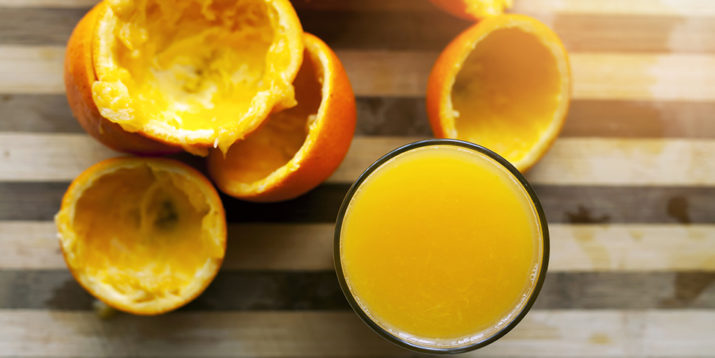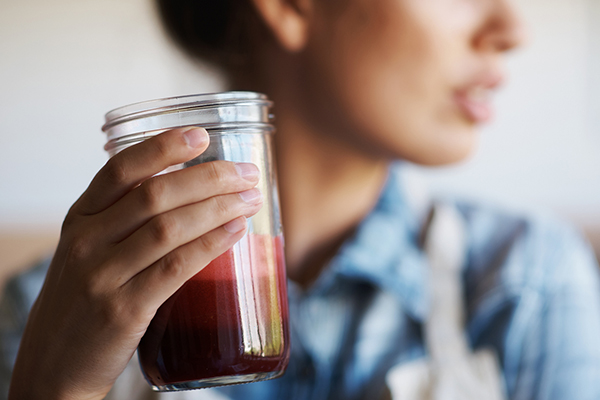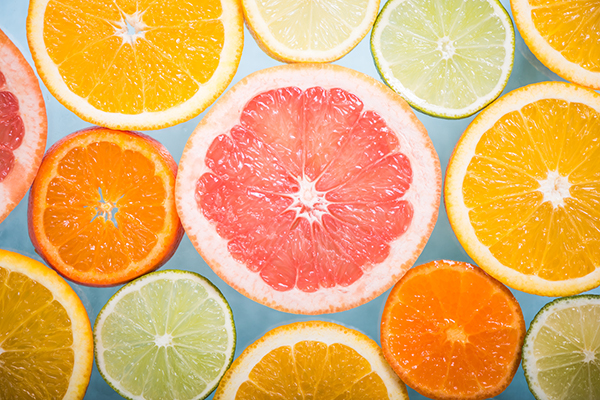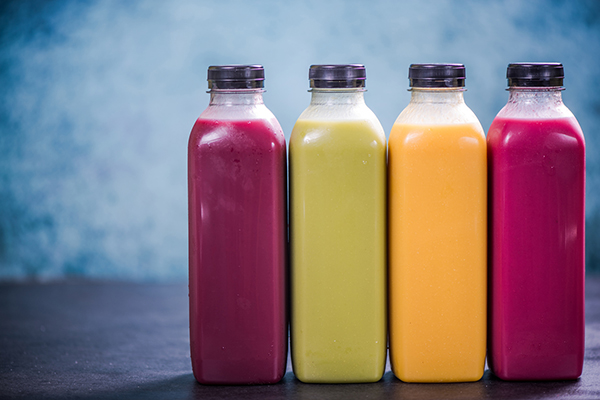Is Juice Healthy or Unhealthy?

A decade or more ago, if you were drinking juice, it was likely apple, orange, or grape, and you’d be sipping it as a beverage alongside your meal. But juice has come a long way.
Your juice of choice today is more likely a mix of veggies (often dark leafy greens) with fruit, and perhaps more adventurous ingredients like matcha, spirulina, or activated charcoal.
Cold-pressed juice is a hot trend, but is it as good for you as you think? Before you start questioning your allegiance to green juice — Should I avoid drinking juice?! — or shell out for a pricey at-home juicer, get the scoop on this pressing issue.

Is Juice Healthy?
Juice gained a reputation as a “healthy food” during World War II, when the government sent it to troops to ensure they were getting enough vitamin C for a strong immune system. Orange juice started showing up on breakfast tables soon after the first frozen concentrate was introduced in 1946.
The morning glass of OJ has been replaced by the grab-and-go bottle of juice. Today, juicing is often seen as a convenient way to get your daily quota of fruit and vegetables or used as a meal replacement (especially if you don’t like vegetables). But is juice really as good for you as you think it is?
Not exactly, say nutrition experts. “While juice provides some vitamins and minerals, such as vitamin C, beta carotene, and potassium, it’s often a concentrated source of the natural sugar in fruit,” says Lisa Cimperman, M.S., R.D.N., L.D., a clinical dietitian and spokesperson for the Academy of Nutrition and Dietetics.
“This means it’s a concentrated source of calories.” She warns that this can have a negative effect on the waistline. “Our body doesn’t register liquid calories as being filling or satisfying, so individuals frequently find themselves simply consuming more to compensate.”

Is Juice Really High in Sugar?
Is fruit juice really high in sugar? It depends. A cup of orange juice contains 21 grams of sugar, and there are 24 grams in apple juice — only marginally less than the 26 grams in a cup of cola. However, most juice devotees are drinking juice that contains at least some vegetables, not all-fruit juices.
Green juices will have less sugar (some have as little as 4 grams per cup). While some naturally sweet all-veggie juices are slightly higher, like carrot (10 grams per cup) and beet (13 grams per cup), they still contain less natural sugar than fruit juices. (The average American consumes three pounds of added sugar per week!)
What About Fiber and Juice Drinks?
Fiber helps fill us up, and it supports good gut health, too. So what about fiber and juice drinks? In short, juice is lacking in fiber. And while we’re eating way too much sugar on average, we are collectively not eating enough fiber, which is only found in plants like whole fruits and vegetables.
We only get about 16 grams a day, but adults (under 50) should strive for 25 grams (women) and 38 grams (men) per day. Women and men over 50 should try to eat 21 and 30 grams, respectively, per day.
Consider this example: A cup of orange sections has 14 grams of sugar — but orange juice has 33 percent more sugar. However, oranges have 4 grams of fiber; juice has a mere half a gram. But why does fiber matter? Fiber helps slow digestion so that your body burns through the sugars (aka carbohydrates) in fruit (and vegetables) more slowly.
“Fiber is important for a couple reasons,” says Paige Benté, M.S., R.D., C.S.S.D. “It gives substance to our food, making us feel fuller longer, improves gut health by moderating transit time, and acts as a prebiotic (the food for all the good bacteria in our gut).”
And it’s not just fiber that can be reduced by drinking juice versus eating fruit or vegetables. Studies show that juicing can reduce the amount of antioxidants provided by fruit by as much as 54 percent.
In short, you’re much better off eating an apple than drinking one.

Should I Do a Juice Cleanse?
Going on a juice cleanse is fashionable, but it’s really just a short-term, high-carb, low-cal diet that, yes, may also provide more antioxidants and phytonutrients than you would otherwise consume. Before you ask yourself, “Should I do a juice cleanse?”… you should know what you’re getting into — and know that it’s rarely a good idea, says Benté.
Alongside a large dose of sugar (which may be the boost that people feel when doing such a “cleanse”), Benté also notes that you’re missing out on essential proteins and fats, which juices lack.
“For a couple of days, this wouldn’t be dangerous unless you have a medical condition which requires consistent protein intake, or are pregnant,” she says. “But for much longer, this is not a wise idea for anyone.”
A juice-only diet doesn’t offer any advantage over eating a balanced diet and won’t help you absorb any more goodness, says Benté. “Yes, you’re consuming a lot of vitamins and minerals, and juice is easy to digest,” she says. “But our bodies are very adept at breaking down whole foods and absorbing nutrients. If you are eating a balanced, adequate, and varied diet, you will be getting an appropriate amount of vitamins and minerals anyway.”
But what about juice cleanses and weight loss? Are juice cleanses good or bad?
Sorry to burst your bubble: “As for weight loss, weight lost during a juice cleanse is mostly water weight or due to the fact that you are consuming alarmingly inadequate calories, so as soon as you go back to eating your regular diet. the weight will come back,” says Benté. “There aren’t really any pros.”
(Pro tip: Find out what the difference is between a cleanse and a detox.)
Should You Stop Drinking Juice?
Is it time to give away your fancy juicer or shun your weekly visit to your favorite juice bar? Should you stop drinking juice entirely (even your fave organic and cold-pressed spinach, celery, and ginger juice)? While your bank account would definitely thank you, you do not necessarily need to stop drinking juice entirely.
“If you’re generally following a healthy diet, then drinking a glass of fruit juice a day isn’t going to be a problem,” says Monika Siemicka, a specialist dietitian and spokesperson for the British Dietetic Association. “Aim for a juice that includes vegetables, as they’re naturally lower in sugar than fruit, and just make sure you’re not relying on it as your sole source of fruit and vegetables.”
According to MyPlate, a serving of juice is one cup, or 8 fluid ounces. But if you’re following Portion Fix, a serving of 100 percent fruit juice is 4 fluid ounces. Juice counts as a treat, which can replace a purple container up to three times a week.
That’s likely far less than what your juice bar serves up. But, you can also add a splash of juices like cranberry, orange, and grapefruit to jazz up your plain water anytime.
All Juices Are Not Created Equal
When it comes to making healthy choices, are all juices created equal? If you are consuming juice drinks as part of a balanced diet, it is useful to know which option to choose, as not all juices are created equal in terms of sugar and calories. Here are some of the types of juice drinks you might encounter:
Is Concentrated Fruit Juice Healthy?
What is concentrated juice? Is concentrated fruit juice healthy? If you’re buying cartons of juice from the supermarket, you may notice many of them say “from concentrate.” Concentrated fruit juice has had the water removed so that it can be frozen. This lengthens the shelf life and means it takes up less space when being stored.
The concentrated juice is often rehydrated with non-concentrated juice, to give the final product a bigger taste punch before being sold.
Watch out for: added sugars. Processing and storing juice can reduce natural flavor, so sugars and additives are often added during the rehydration process. Your juice should contain no added sweeteners or sugars.
Is Cold-Pressed Juice Healthy?
Cold-pressed juice is created without heat using a hydraulic press, meaning it must be kept in the fridge and needs to be consumed within a few days of production.
Is cold-pressed juice healthy? “The idea is, that by not using any heat, less vitamins and minerals are lost in the process of making cold-pressed juice.” says Siemicka. But whenever you process fruit, you’ll still lose some nutrition and fiber, “and there’s still going to be a lot of sugar,” she adds.
Watch out for: the price. While studies show that cold-pressing might maintain more of a fruit’s original nutrients, it’s also worth bearing in mind that cold-pressed juices and juicers can be eye-wateringly expensive for something that won’t fill you up.
Is Juice from a Juice Bar Healthy?
Juice bars often create your juice right in front of you, allowing you to customize your drink. But is juice from a juice bar healthy for you? The juice may or may not be cold-pressed, but what matters more is the juice purveyor’s cleanliness and food storage practices. Juice is not immune to foodborne illnesses.
Most juice bars do not pasteurize their juices. Keep fresh-made juice refrigerated and drink within a day.
Watch out for: portion sizes. These juices are often a lot larger than one serving. Cimperman recommends choosing juices that also include vegetables to reduce the amount of sugar and calories you’re consuming.
Is Homemade Juice Healthy?
Is homemade juice healthy (is it healthier than store-bought)? If you like juice and want to spend the money on a juicer, homemade juice can be as healthy as you want it to be. To boost nutrition content, Siemicka recommends “juicing” in your blender, as this retains some of the pulp so it has slightly more fiber.
There are numerous home juicers out there, but they pretty much all strip out the fiber and yield the same end result as you’d get from a juice bar or even at some grocery stores.
Watch out for: portion sizes again. But the obvious advantage of homemade juice is that you know exactly what you’re putting in it. It also may be cheaper in the long run.
4 Ways to Make Your Juice Healthier
Still want to consume the occasional kale and pear juice drink for a treat as a part of your healthy diet? You may be better off eating your fruit and veggies rather than drinking them, but if you are including juice as part of a balanced diet, here are four ways to make your juice healthier.
- Mind your serving sizes. Don’t juice more fruits and vegetables than you would eat whole, Benté advises. “If you juice one apple and one carrot, awesome,” she says. “If you start juicing four oranges, a head of lettuce, and six beets, that’s too much. Your juice then becomes a source of sugar and extra calories that won’t keep you full.”
- Make your juice at least half vegetables. “Vegetable juice is always lower in sugar than fruit juice,” says Benté. Add plenty of dark leafy greens and even herbs like cilantro and parsley.
- Add ice. Adding a few ice cubes to your juice will not only keep it cooler, it’ll increase the volume, so you will feel like you’re drinking a larger juice and consume fewer calories. Adding ice can also slow you down when drinking.
- Try fruity water instead. “A lot of people say they drink juice because they don’t like the taste of water,” says Siemicka. “If that’s the case, dilute your juice with water or infuse water with fresh fruit for a lower-sugar fruity drink.”
The Bottom Line
Juicing can be a part of a healthy, balanced diet, but there’s no reason to go on a juice cleanse or use juice in place of a meal. Enjoy juice on occasion as a beverage, but don’t fall for the hype that juicing your fruits and vegetables is the same as eating them.
If you’re a fan of juice, remember to keep your portions in check, use as many veggies as you do fruit (if not more!), add ice, and swap in fruity water for your juice.
If you’re trying to up your produce intake, arm yourself with plenty of healthy vegetable recipes and consider integrating Power Greens into your healthy diet.
